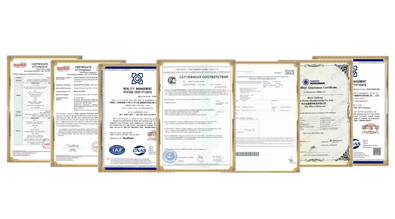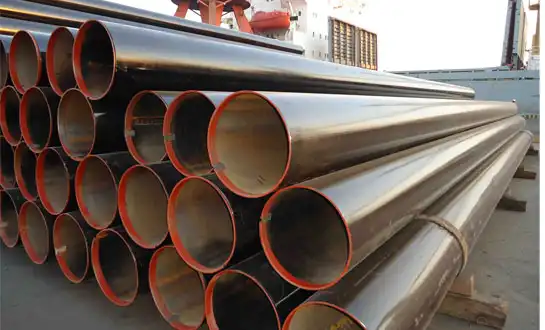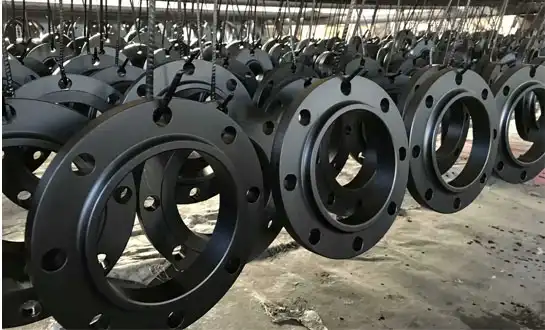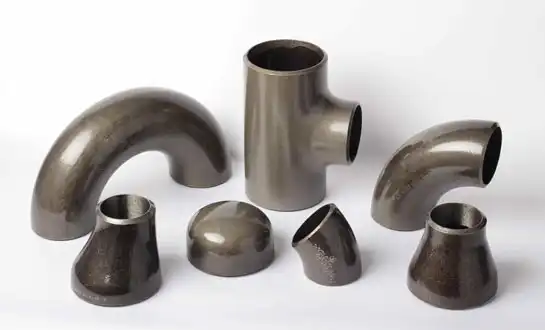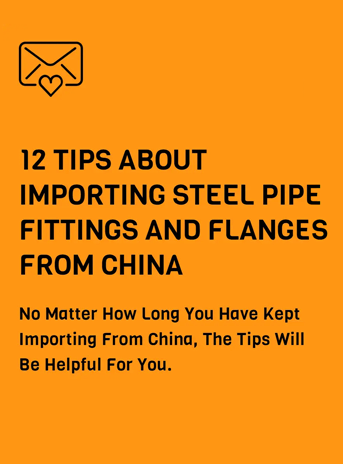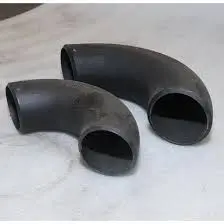
What types of pipe fittings resist chemical attack and corrosion?
When working with acids that break down metal, you need to choose pipe parts that can handle them. There are parts that are made just for this job, like
Stainless Steel Fittings
Because chemicals don't hurt stainless steel pipe fittings, they are often used in places where chemicals could hurt things. There are different layers of security for each grade:
- 316/316L: It is very resistant to rusting, especially against chlorides.
- 304/304L: Offers good protection from rust in general
- There are two types of duplexes: Perfect for places with a lot of corrosion
Plastic Fittings
Certain plastic materials offer exceptional chemical resistance:
- PVC can handle a lot of acids, bases, and salts.
- Polyvinylidene fluoride (PVDF) can be mixed with bromine and strong acids.
- Polyvinylidene fluoride (PVDF) can be mixed with bromine and strong acids.
Alloy Fittings
Specialized alloys provide superior corrosion resistance in extreme conditions:
- When it's hard, some metals are better at keeping rust away:
- This metal is able to handle things that are very acidic, like hot acids.
- When there is a lot of heat and acidic stuff around, Inconel works well.
Lined Fittings
These parts are strong like metal but don't react badly with chemicals like plastics:
- steel parts lined with PTFE
- Fittings lined with PFA (Perfluoroalkoxy)
- Glass-lined parts that are very resistant to rust
There are pros and cons to each type of setting for each type of chemistry temperature pipe elbow. It is picked based on how much it costs, what kind of acidic stuff will be used, and how hot and tough it needs to be.
Materials and coatings for chemical-resistant pipe fittings
A lot of what the pipes are made of and how they are kept safe affects how well they work in dangerous areas. You should think about these important choices:
Corrosion-Resistant Materials
Here are a few things that stand out because they are naturally hard to attack by chemicals:
- Titanium is very strong against acids and chlorides that break down metals.
- Working with hot liquids is easy to do with zirconium.
- Chemicals that break down metals don't work on tantalum very well.
- It is high in silicon and can't be broken down by sulfuric or nitric acids.
Protective Coatings
Coatings can significantly enhance the corrosion resistance of pipe fittings:
- Epoxy coatings are widely used and are good at resisting chemicals.
- Chemical protection and non-stick qualities are great in fluoropolymer coatings.
- Epoxy coatings are widely used and are good at resisting chemicals.
- Chemical protection and non-stick qualities are great in fluoropolymer coatings.
- Coatings made of ceramic: Very strong against wear and chemical attack
Surface Treatments
Various surface treatments can improve corrosion resistance:
This process makes it less likely for stainless steel to rust.
This method smooths out the surface and makes it less likely to rust.
When metal is anodized, a chemical layer is put on top of it to protect it.
Composite Materials
Some perks of modern materials that make them stand out are
- Fiber-based PVC is strong and doesn't mix with drugs.
- It's light, strong, and won't rust.
The things that cover or protect it, including pipe elbows, are based on its pH level, temperature, pressure, and mechanical needs. When you move things, you should think about how well the chemicals, things, and best temperatures work with each other. Also, think about what might happen.
How to select pipe fittings for acidic, alkaline, and solvent applications?
You need to give a lot of thought to a few things in order to pick the right pipe parts for liquid, acidic, and basic uses. Here is a list to help you make smart decisions:
Understand the Chemical Environment
Begin by thoroughly analyzing the chemical properties of the substances you'll be handling:
- pH levels for acidic or alkaline solutions
- The amount of chemicals present
- Temperatures and forces used
- Presence of oxidizing agents or halogens
Consider Material Compatibility
Match the material of the part to the elements around it:
- For work with strong acids, you should use fittings made of PTFE, Hastelloy, or tantalum.
- Most of the time, nickel metals or stainless steel (316L) work well with acidic oils.
- You can use PTFE, PFA, or some types of stainless steel for this.
Evaluate Performance Requirements
Consider the operational demands of your system:
- Pressure ratings required for the application
- Temperature resistance needed
- Mechanical strength and durability expectations
Assess Long-Term Effects
Consider more than just instant compatibility:
- Stress rust cracks could happen
- Pitting or crack rust is a possibility.
- Galvanic rusting could happen in systems with more than one metal.
Consider Industry Standards and Regulations
Make sure that the appropriate rules are followed:
- ASME rules for pipes and pressure tanks
- Food and drug proposals must follow FDA rules.
- Rules for treating chemicals that protect the environment
Conduct Material Testing
When in doubt, perform tests:
- Immersion tests to evaluate chemical resistance
- Stress tests under simulated operating conditions
- Faster aging tests to guess how well something will work in the long run
You can choose pipe parts, including pipe elbows, that will work reliably, safely, and for a long time in your chemical handling application by giving these things careful thought. Don't forget that the goal is to find a good mix between rust protection, cost-effectiveness, and operating efficiency.
Conclusion
It is very important to choose the right pipe parts when dealing with dangerous chemicals because they affect safety, economy, and long-term costs. Know the different kinds of parts, the highly proof materials and finishes, and the things you should think about when making your choice. This will protect your systems and make sure they work efficiently.
When it comes to pipe parts that don't rust, there is no one solution that fits all. Think about what you need to do, the risks, and how long something will last before you use it. When you need to make a choice, it's often smart to talk to professionals or try a lot of different things.
You should only buy pipe parts from a company you can trust if you have to work with dangerous chemicals. HEBEI RAYOUNG PIPELINE TECHNOLOGY CO., LTD makes many kinds of industrial pipe parts that can be used for many tasks, even tough ones. We care about quality and know a lot about carbon steel pipe fittings because we have an ISO 9001:2015 quality mark. We can help you choose the best thing for you.
FAQ
1. How often should corrosion-resistant pipe fittings be inspected?
The inspection frequency depends on the aggressiveness of the chemical environment and the criticality of the system. Generally, it's recommended to conduct visual inspections at least annually, with more frequent checks in highly corrosive conditions. Nondestructive testing methods may be employed every 3-5 years or as specified by industry standards.ds.
2. Can I use standard stainless steel fittings for all corrosive applications?
While stainless steel offers good corrosion resistance, it's not suitable for all corrosive environments. Highly concentrated acids or chloride-rich solutions may require more specialized materials like Hastelloy or PTFE-lined fittings. Always check the chemical compatibility before selecting fittings.
3. Are plastic pipe fittings as durable as metal ones in corrosive environments?
In many corrosive environments, high-performance plastic fittings can be more durable than metal ones. Materials like PTFE and PVDF offer excellent chemical resistance. However, they may have lower pressure and temperature ratings compared to metal fittings. The choice depends on your specific operational requirements.
Expert Solutions for Corrosion-Resistant Pipe Fittings | RAYOUNG
To keep everyone safe and get the job done quickly, it's important to choose the right pipe parts, such as pipe elbows. This is because chemicals that break down metal can be harmful. Parts that work in places with a lot of chemicals can be hard to find. We've been there and know this.
We have someone on staff ready to help you choose the best corrosion-resistant pipe for your needs. This will keep chemicals out. We can help you find parts made of stainless steel. We can help you find strong metal parts for tough jobs. We can get it for you.
Don't compromise on quality when it comes to handling corrosive chemicals. Contact us today at info@hb-steel.com to discuss your project requirements. Let RAYOUNG be your trusted partner in ensuring the safety, efficiency, and longevity of your chemical handling systems with our high-quality, corrosion-resistant pipe fittings.
References
1. Smith, J. (2022). "Corrosion-Resistant Materials in Chemical Processing Industries." Journal of Materials Engineering and Performance, 31(8), 6112-6125.
2. Johnson, A. et al. (2021). "Selection Criteria for Pipe Fittings in Aggressive Chemical Environments." Chemical Engineering Progress, 117(9), 45-52.
3. Brown, L. (2023). "Advanced Coatings for Corrosion Protection in Industrial Piping Systems." Corrosion Science, 205, 110394.
4. Davis, R. (2022). "Comparative Study of Plastic and Metal Pipe Fittings in Acidic Media." Materials and Corrosion, 73(5), 786-795.
5. Wilson, E. (2021). "Long-term Performance of Alloy Pipe Fittings in Chloride-rich Environments." Corrosion Engineering, Science and Technology, 56(3), 237-246.
6. Thompson, G. (2023). "Innovations in Corrosion-Resistant Pipe Fitting Technologies." Industrial & Engineering Chemistry Research, 62(15), 6980-6992.

